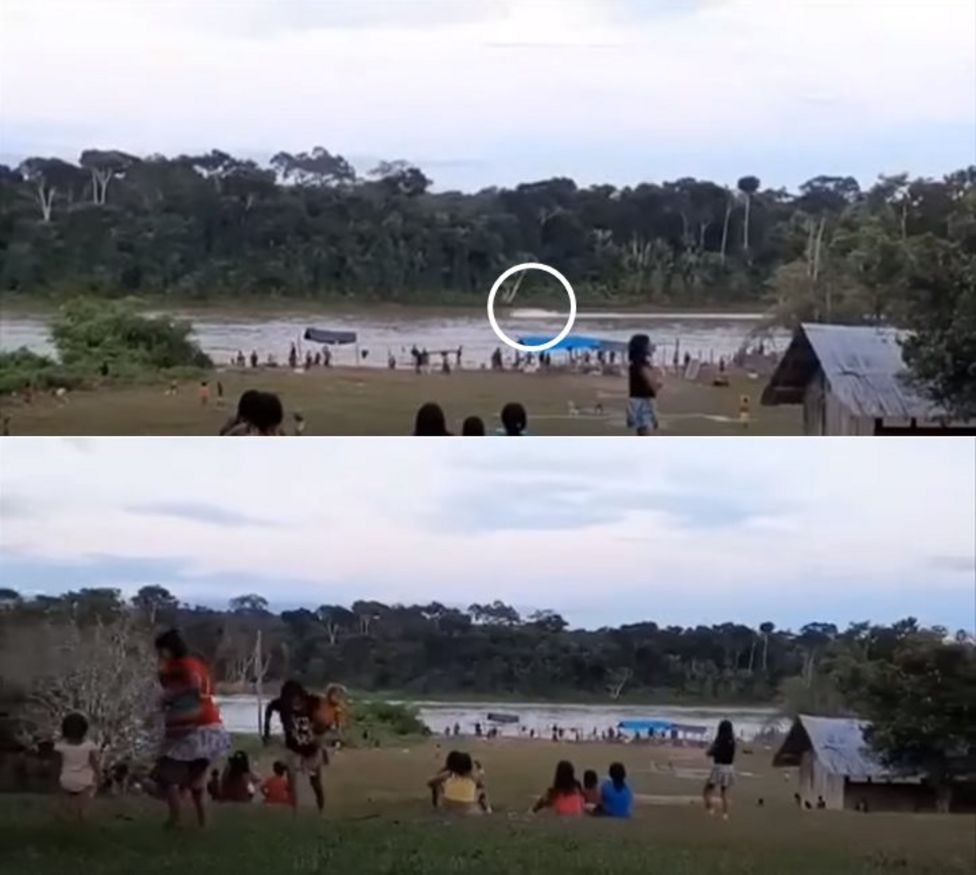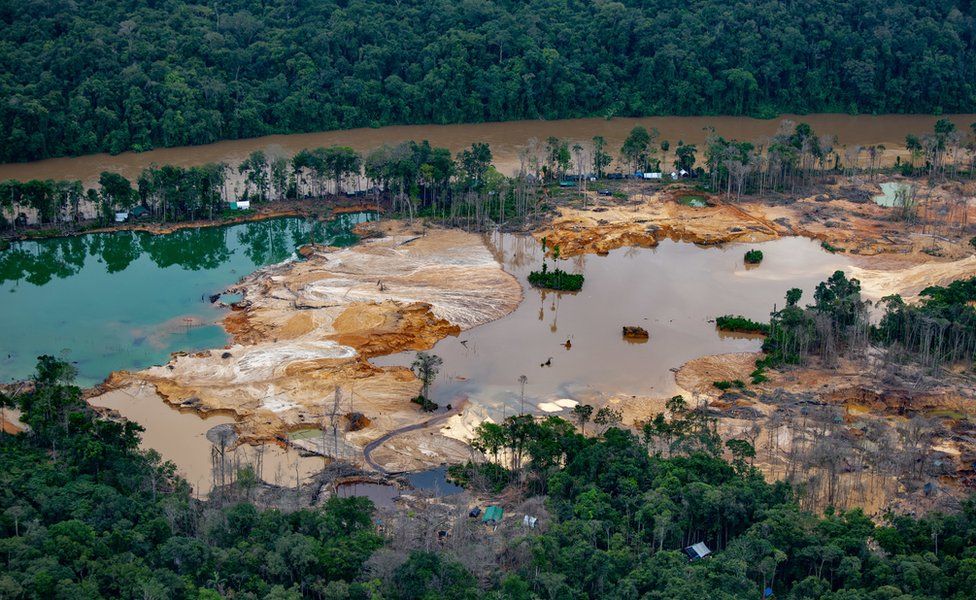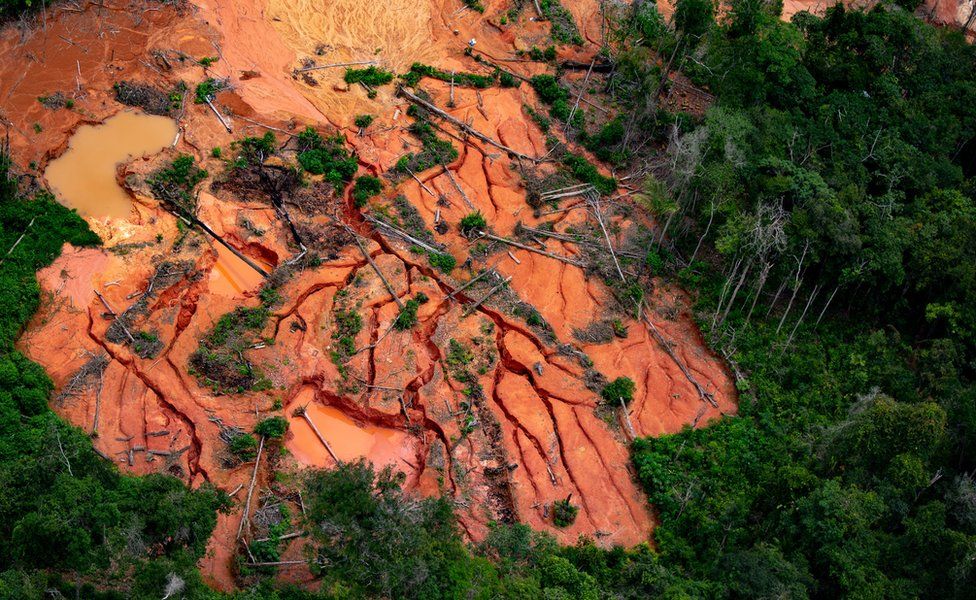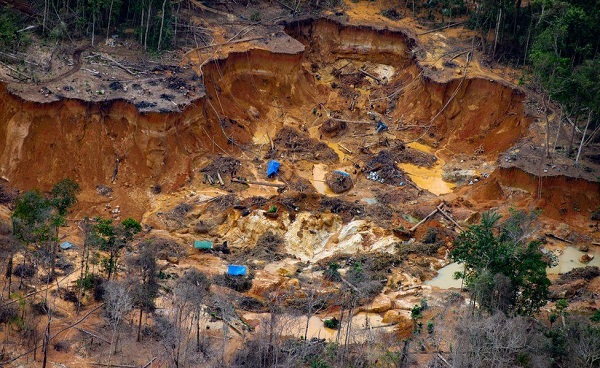At around midday on 11 May, Dario Kopenawa, an indigenous leader, received a desperate phone call from a remote village in the Brazilian Amazon.
Palimiú has a population of about 1,000, and they live in large communal houses on the banks of a river called Uraricoera. You can only reach it by plane, or after a long journey on a boat.
Kopenawa, from the Yanomami tribe, is used to hearing pleas for help from communities in the rainforest, but this one was different.
"They attacked us," a man said, "they almost killed us". They, Kopenawa was told, were garimpeiros, or illegal gold miners, who had arrived on seven motorboats, some carrying automatic weapons, and started shooting indiscriminately.
Hiding behind trees, the Yanomami fought back, using shotguns and bows. An indigenous man was grazed by a bullet in the head, Kopenawa learned, and four miners were injured. The attackers left after half an hour, but threatened to come back for revenge. Terrified, women fled into the dense jungle with their children to seek refuge. It was chaotic, and two boys, aged one and five, drowned.
Palimiú, located deep in the state of Roraima, sits on Brazil's largest indigenous reserve, which has an area similar to Portugal and 27,000 people. Mining is illegal there, but prospectors have always found ways to do their work. "Garimpeiros are all over the place," Kopenawa said. He avoids going to areas where they are because of death threats and, after the call, he alerted the authorities, saying something had to be done.
READ ALSO:Â John McAfee: Anti-virus creator found dead in prison cell
The next day, a team of federal police travelled to Palimiú on a small plane, and were joined by Junior Hekukari, who heads the local indigenous health council. As he was leaving the area, Hekukari spotted some boats drifting with their engines switched off, and he guessed they were trying to avoid being noticed. As the men in the vessels approached, they shot multiple times at the village.
"The agents screamed 'Police, police'," Hekukari told me, "but they didn't stop. They had no respect". The officers responded, and there was an intense gun fight. The group left five minutes later and nobody was injured. When Hekukari reported what had happened, Kopenawa was stunned. If even the police were being attacked, he said, none of his people was safe.

The intrusions by garimpeiros in indigenous reserves have intensified under far-right President Jair Bolsonaro, who plans to open some of the areas to mining and agriculture. Instituto Socioambiental (ISA), a non-profit group, estimates there are about 20,000 of them in the Yanomami territory alone, and Hekukari told me "they do what they want because they know nothing will happen to them".
Alisson Marugal, the federal prosecutor in Roraima, said they had been encouraged by a surge in gold prices and an order by Funai, the government's indigenous affairs agency, that limited field work because of the pandemic. "Illegal miners did not self-isolate or do social distancing," he said. "In fact, they intensified their activities."
The reserves are one of the most effective ways to protect the Amazon, the world's largest rainforest and a huge carbon store that helps slow down global warming. But President Bolsonaro, a climate change sceptic who is supported by powerful agribusiness leaders, considers them too big for the number of people who live there and an obstacle to development.
The president, whose own father was a garimpeiro, is particularly critical of the extension of the Yanomami territory, established in 1992 in a region where vast mineral riches are located. Kopenawa, who lives in the state capital Boa Vista where he leads the indigenous association called Hutakara, said "Bolsonaro supports the garimpeiros" and had no interest in protecting the Yanomami. "Our territory is being disrespected," he said. "And our calls for help are not being heard."
In Congress, the Bolsonaro government is pushing an agenda that opponents warn poses an existential threat to the Amazon and, consequently, to indigenous people. The Chamber of Deputies is due to vote on a bill that would legalise the private occupation of public land. Another proposal could pave the way for the reduction of indigenous areas that already exist.
"Illegal miners have been emboldened... by a discourse that legitimises their work," Prosecutor Marugal said. "Indigenous communities are under extreme pressure".







